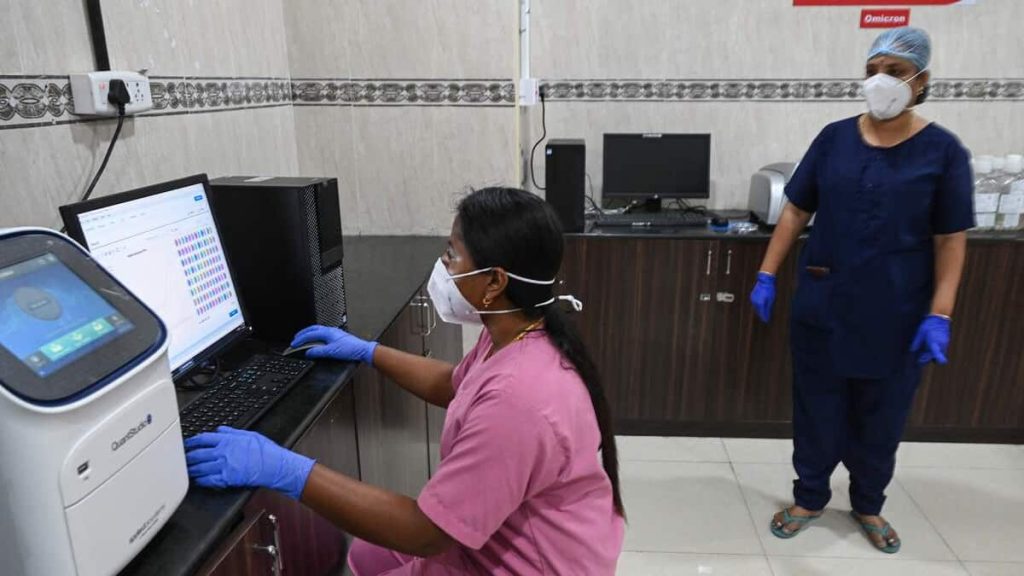Omicron: The name of the new variable worrying the world is reminiscent of a sci-fi villain, but it’s too early to say what impact it might have on the COVID-19 pandemic. An update on what we know and, above all, what we don’t know yet.
From where does he come ?
we do not know. According to South African epidemiologist Salem Abdulkarim, it was first reported in Botswana before it was detected in South Africa, which announced it on November 25.
Jean-François Delfraissy, head of the scientific council that directs the French government, suggested at the beginning of December: “He may have been touring South Africa (…) for longer than we thought, since early October.”
Why is he worried?
The day after South Africa’s announcement, the World Health Organization classified the new variant as “of concern”, which gave it a Greek letter name, as before.
The concerns at the moment are largely theoretical: they come on the one hand from the genetic characteristics of the Omicron, and on the other hand from what one observes in South Africa.
From a genetic point of view, it contains an unprecedented number of mutations, including about thirty mutations in the spike protein, which is the key to the virus entering the body.
Based on the experience of previous variants, it is known that some of these mutations may be associated with increased transmissibility and decreased efficacy of vaccines.
On the other hand, the number of COVID cases and the share attributed to this variant has seen a strong rise in South Africa.
Will Delta take off?
This is the central question that cannot be answered yet.
Delta is now almost dominant in the world thanks to its characteristics that have enabled it to replace Alpha.
In this great competition between variants, those who appeared in recent months (Mu or Lambda) did not manage to take first place from it.
The situation in South Africa raises concerns that Omicron may be able to. But this is not certain, especially since there is little delta presence in South Africa.
If the trends observed in this country are confirmed elsewhere, Omicron could become the majority in Europe “in the very coming months,” the European Center for Disease Prevention and Control (ECDC) estimates. But these mathematical predictions are based on very preliminary data, which may change.
The American expert Eric Topol emphasized in the British Guardian newspaper, while leaning more towards the second hypothesis.
At this point, Omicron was discovered on all continents.
More dangerous or not?
This is another important question that cannot be answered yet, although several public health officials have made reassuring words this week.
Prominent American scientist Anthony Fauci told AFP on Tuesday that it was “almost certain” that Omicron was no more dangerous than Delta, even though he thought it could be less.
Hospitalization data are somewhat reassuring in South Africa, but it must be remembered that the population is fairly young, and therefore less at risk of serious forms.
The center said that all cases documented in Europe so far are “either asymptomatic or mild”.
This will open the door to optimistic guesswork.
“If Omicron is highly contagious, but not bad (not filling hospitals), it will give an immune suite and will contribute to a mitigation of SARS-CoV-2 in a mild seasonal virus, signaling the end of the crisis,” French virologist Bruno Canard noted on Twitter. .
But he said such a scenario would be “coincidence”. Many specialists emphasize that this hypothesis is not the most likely and caution against over-optimism. If Omicron combined lower risk but greater contagiousness, the consequences would still be really serious on a collective level.
What is the effect of vaccines?
Again, it’s too early to say whether this alternative will reduce the effectiveness of vaccines, despite the fear.
Preliminary studies, which have not yet been independently reviewed, actually show this week that the vaccines appear to generate less effective antibodies against Omicron than previous variants.
But this only partially prejudges the true efficacy of vaccines and even if this goes down, it won’t mean they won’t be effective at all.
Because antibodies are only one part of the immune response, which also includes cells called T lymphocytes. Difficult to measure, this “cellular immunity” plays a very important role, especially against severe forms of disease.
“There is no reason to doubt” that current vaccines prevent severe forms in patients with Omicron, said Michael Ryan, head of the emergency department at the World Health Organization.

“Total coffee aficionado. Travel buff. Music ninja. Bacon nerd. Beeraholic.”






More Stories
Fluoroscopy | “Self-coup”?
This is why you find it difficult to wake up in the morning.
She meets her boss at the airport after taking sick leave.